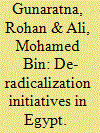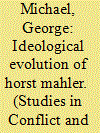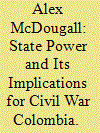| Srl | Item |
| 1 |
ID:
087840


|
|
|
|
|
| Publication |
2009.
|
| Summary/Abstract |
This article provides a preliminary insight to the ideological revision of the two principle Islamist militant groups in Egypt, the Al-Gamaa Al-Islamiyya and Al-Jihad Al-Islami. Several leaders of these groups have taken steps to renounce violence and promote peace co-existence with the government and society. They have also repented and apologized for the past terror attacks in Egypt that led to the killing of many innocent civilians, government officials and tourists. In addition, they have gone to great lengths to counter and argue against Al Qaeda's violent ideology and to restrict its influence on the Muslim population. The ideological revision of these two groups reflects a significant shift in the efforts of the Egyptian authorities and community to address the problem of ideological extremism and terrorism in the country.
|
|
|
|
|
|
|
|
|
|
|
|
|
|
|
|
| 2 |
ID:
087844


|
|
|
|
|
| Publication |
2009.
|
| Summary/Abstract |
In the late 1990s, Horst Mahler, a former leader of the Red Army Faction and scion of the radical left, announced his affinity for the extreme right and joined the National Democratic Party of Germany (Nationaldemokratische Partei Deutschlands; NPD)-Germany's principal far right party. Later distancing himself from party politics, he founded the Deutsches Kolleg, a far right think tank that promotes German nationalism. Although ostensibly now a rightist, Mahler has synthesized much of his original left-wing ideology into a far right Weltanschauung that features nationalism, anti-Americanism, and anti-Semitism, with a strident critique of capitalism. As such, it has the potential to appeal to some segments of the contemporary anti-globalization movement, the international extreme right, and even Islamists.
|
|
|
|
|
|
|
|
|
|
|
|
|
|
|
|
| 3 |
ID:
087842


|
|
|
|
|
| Publication |
2009.
|
| Summary/Abstract |
Little is known about the makeup of and connections between the various armed groups-state and non-state-of the Sulu archipelago in the southwestern Philippines. The article sheds light on these issues through the study of a notorious "lost command" on Basilan island in the 1990s. Drawing on primary and secondary sources, the article focuses on two kidnapping operations of the gang as a case study to infer its composition and relations with the Moro National Liberation Front (MNLF) and the Abu Sayyaf. The article concludes with an analysis of the gang as an exemplum of the traditional fundamental political unit found in the zone.
|
|
|
|
|
|
|
|
|
|
|
|
|
|
|
|
| 4 |
ID:
087843


|
|
|
|
|
| Publication |
2009.
|
| Summary/Abstract |
The following article examines the relationship between state power and civil war in Colombia. It presents three key findings. First, state weakness has provided armed groups with the political opportunity for rebellion. In this respect, most rebel consolidation takes place in areas of Colombia that lack a strong state presence. Second, the growth and evolution of Colombia's armed groups are directly related to their ability to loot exportable natural resource commodities. In stateless areas of Colombia, rebel consolidation tends to take place in areas where the drug trade is also present. Third, the conditions of civil war have led insurgent groups to mimic some of the basic functions and attributes of statehood. Colombia's conflict is more than just a manifestation of popular frustration; indeed, this article shows that civil war is also a form of state-building.
|
|
|
|
|
|
|
|
|
|
|
|
|
|
|
|
| 5 |
ID:
087841


|
|
|
|
|
| Publication |
2009.
|
| Summary/Abstract |
This article reviews the new journal Critical Studies on Terrorism. The fashionable approach that this journal adopts towards the contemporary phenomenon of terrorism maintains that a "critical" and "self-reflexive" approach to the study of terrorism reveals a variety of shortcomings in the discipline. These range from a distorting over-identification with the Western democratic state perspective on terrorism to a failure to empathize with the misunderstood, non-Western, "other." This review examines whether the claims of the critical approach adds anything, other than pedantry and obscurity, to our understanding of the phenomenon. It concludes that it does not.
|
|
|
|
|
|
|
|
|
|
|
|
|
|
|
|